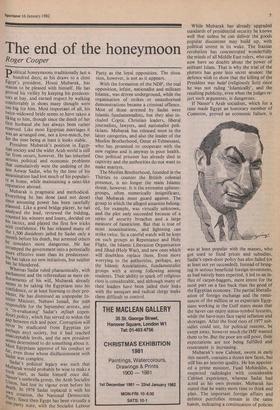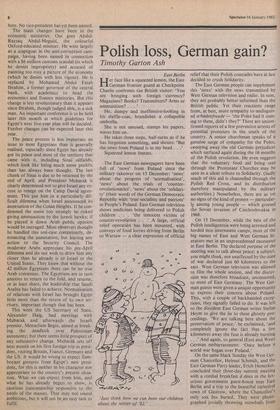The end of the honeymoon
Roger Cooper Political honeymoons traditionally last a hundred days; as his draws to a close Egypt's president, Hosni Mubarak, has reason to be pleased with himself. He has proved his virility by keeping his predeces- sors at bay, and earned respect by walking comfortably in shoes many thought were too big for him. Most important of all, his twice-widowed bride seems to have taken a liking to him, though since the death of her first husband she has always been rather reserved. Like most Egyptian marriages it was an arranged one, not a love-match, but for the time being at least it looks stable. President Mubarak's position in Egyp- tian society and the wider Arab world is still far from secure, however. He has inherited Serious political and economic problems that cumulatively were the undoing of the late Anwar Sadat, who by the time of his assassination had lost much of his populari- ty at home, while maintaining a saint-like reputation abroad.
Mubarak is pragmatic and methodical. Everything he has done (and not done) since assuming power has been carefully Planned. Like a good bridge player, he has analysed the lead, reviewed the bidding, counted his winners and losers, decided on his tactics, and played the first few tricks With confidence. He has released many of the 1,500 dissidents jailed by Sadat only a Month before his death, but arrested others he considers more dangerous. He has revamped the government into a potentially more effective team than its predecessor. He has taken no new initiatives, but neither has he blundered. Whereas Sadat ruled pharaonically, with Parliament and the referendum as mere en- dorsements of his will, Mubarak already seems to be taking the Egyptians into his confidence, or at least listening to their pro- blems. He has dismissed an unpopular In- terior Minister, Nabawi Ismail, the man responsible for the September arrests, and is 're-evaluating' Sadat's infitah (open- door) policy, which has served to widen the gap between rich and poor. Corruption will never be eradicated from Egyptian (or Perhaps any) society, but it had reached unacceptable levels, and the new president seems determined to do something about it. Most Egyptians approve of his conduct so tar, even those whose disillusionment with Sadat was complete.
Sadat's political legacy was such that
Mubarak
fresh would probably be wise to make a
start, as Sadat himself once did. Nasser's umbrella group, the Arab Socialist Union, hien, had lost its vigour even before his death. In 1978 Sadat replaced it with his own creation, the National Democratic °arty. Since then Egypt has been virtually a rle-Party state, with the Socialist Labour
Party as the loyal opposition. The situa- tion, however, is not as it appears.
With the formation of the NDP, the real opposition, leftist, nationalist and militant Islamic, was driven underground, while the organisation of strikes or unauthorised demonstrations became a criminal offence. Most of those arrested by Sadat were Islamic fundamentalists, but they also in- cluded Coptic Christian leaders, liberal journalists, lawyers, and nationalist poli- ticians. Mubarak has released most in the latter categories, and also the leader of the Muslim Brotherhood, Omar el-Telmessani, who has promised to cooperate with the new regime and is anyway in poor health. One political prisoner has already died in captivity and the authorities do not want to make martyrs.
The Muslim Brotherhood, founded in the Thirties to counter the British colonial presence, is no longer the main Islamic threat, however. It is the extremist splinter- groups, often numerically insignificant, that Mubarak must guard against. The group to which the alleged assassins belong- ed, for example, was virtually unknown, and the plot only succeeded because of a series of security breaches and a large measure of fanaticism. But that is true of most assassinations, and lightning can strike twice. So a careful watch will be kept on such groups as Repentance and Holy Flight, the Islamic Liberation Organisation and Jihad (Holy War), and new ones which will doubtless replace them. Even more worrying to the authorities, perhaps, are the Islamic Associations, fundamentalist groups with a strong following among students. Their ability to spark off religious riots is considerable, and although many of their leaders have been jailed their links with the mosques and radical clergy make them difficult to control.
While Mubarak has already upgraded standards of presidential security he knows well that unless he can deliver the goods popular discontent may build up, with political unrest in its wake. The Iranian revolution has concentrated wonderfully the minds of all Middle East rulers, who can now have no doubts about the power of militant Islam. That is why the trial of the plotters has gone into secret session: the defence wish to show that the killing of the President was halal (religiously licit) since he was not ruling Islamically', and the resulting publicity, even when the judges re- ject such arguments, is dangerous.
If Nasser's Arab socialism, which for a time made Egypt an honorary member of Comecon, proved an economic failure, it was at least popular with the masses, who got used to fixed prices and subsidies. Sadat's open-door policy has also failed (or at least not yet succeeded). Instead of bring- ing in serious beneficial foreign investment, as had naively been expected, it led to an in- flux of carpet-baggers, more intent for the most part on a fast buck than the good of the Egyptian economy. The partial liberalis- ation of foreign exchange and the remit- tances of the million or so expatriate Egyp- tians working in the Gulf states mean that the haves can enjoy status-symbol luxuries, while the have-nots face rapid inflation and shortages. After the food riots of 1977 sub- sidies could not, for political reasons, be swept away, however much the IMF wanted them to be. But the poor are still poor, their expectations are not being fulfilled and resentment is increasing.
Mubarak's new Cabinet, sworn in early this month, contains a dozen new faces, but still has an interim quality. He has appoint- ed a prime minister, Fuad Mohieddin, a respected radiologist with considerable Cabinet experience, whereas Sadat had acted as his own premier. Mubarak has stated that he wants more time to think and plan. The important foreign affairs and defence portfolios remain in the same hands, indicating a continuation of policies
here. No vice-president has yet been named.
The main changes have been in the economic ministries. Out goes Abdul- Razzaq Abdul-Meguid, the colourful Oxford-educated minister. He went largely as a scapegoat in the anti-corruption cam- paign, having been named in connection with a $6 million customs scandal (in which he denies impropriety) and accused of painting too rosy a picture of the economy (which he denies with less vigour). He is replaced by Mohamed Abdul Fatah Ibrahim, a former governor of the central bank, with academics to head the economics and finance ministries. But this change is less revolutionary than it appears since Ibrahim, though judged able, is a sick man. An important conference is to be held later this month at which guidelines for Egypt's next five-year plan will be decided. Further changes can be expected later this year.
The peace process is less important an issue to most Egyptians than is generally realised, especially since Egypt has already got its peace and most of the territory that came with it, including Sinai oilfields, which look like being much more prolific than has always been thought. The last chunk of Sinai is due to be returned by the end of April, and President Mubarak is clearly determined not to give Israel any ex- cuse to renege on the Camp David agree- ment. This put him in a particularly dif- ficult dilemma when Israel announced its annexation of the Golan Heights. If he con- demned the move too strongly he risked giving ammunition to the Israeli hawks; if he played it down Arab public opinion would be outraged. Most observers thought he handled this test-case competently, de- nouncing the annexation, but leaving any action to the Security Council. The moderate Arabs appreciate his pre-April dilemma and do not wish to drive him any closer than he already is to Israel or the United States. They know that without the 42 million Egyptians there can be no true Arab consensus. The Egyptians are in turn anxious to return to the fold, and resume, or at least share, the leadership that Saudi Arabia has failed to achieve. Normalisation of relations with Israel has brought Egypt little more than the return of its own ter- ritory, important though that has been.
This week the US Secretary of State, Alexander Haig, had meetings with Mubarak and afterwards the Israeli premier, Menachem Begin, aimed at break- ing the deadlock over Palestinian autonomy; but there seems little prospect of any substantive change. Mubarak sets off next month on his first foreign trip as presi- dent, visiting Britain, France, Germany and the US. It would be wrong to expect flam- boyant gestures from Egypt's new presi- dent, for this is neither in his character nor appropriate to the country's present situa- tion. What we can expect from him, and what he has already begun to show, is cautious statesmanship responsive to the needs of the masses. That may not sound ambitious, but it will not be an easy task to fulfil.



































 Previous page
Previous page